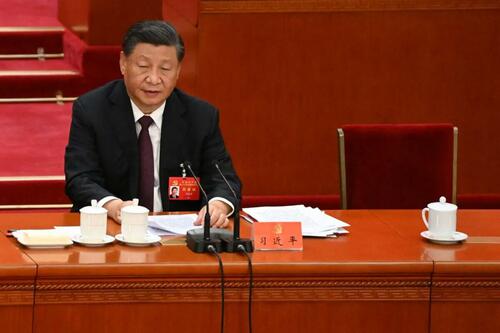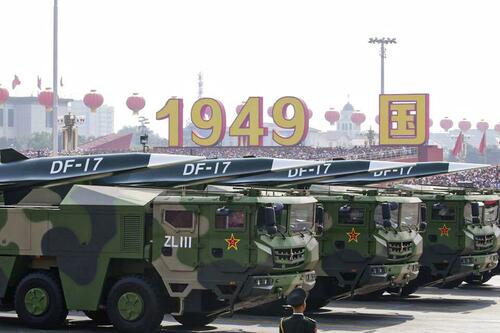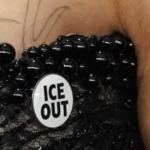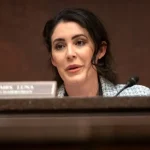
By Alex Wu of The Epoch Times
Chinese Communist Party leader Xi Jinping on May 30 told his top national security officials to be ready for “worst case scenarios” and “stormy seas”.
Xi was addressing officials attending the first National Security Commission meeting since the CCP’s 20th National Congress last year, according to state-run Xinhua.
As commission chairman, Xi said they must deeply understand “the complexity and difficulty of the national security issues we now face have increased significantly.” Xi called on CCP officials to carry forward the “spirit of struggle” and “must adhere to bottom-line thinking and worst-case-scenario thinking, and get ready to undergo the major tests of high winds and rough waves, and even perilous, stormy seas.”
Xi’s use of “bottom-line thinking and worst-case-scenario thinking” has drawn the outside world’s attention.
Wang He, China affairs commentator and The Epoch Times columnist, wrote: “This may be the first time in a top political meeting of the CCP that the two terms are used together. The combination of these two terms shows that the tone of the National Security Commission meeting is really combative.
“When the CCP faces the most dangerous time for it, it acts most viciously. It also means the CCP is at its weakest point and using ferocious acts to cover up its inner weakness.”
‘Complex and Grave’
Xi also emphasized the regime must speed up the modernization of the military, making it more effective in “actual combat and practical use,” as the CCP faces a “complex and grave” situation in terms of national security.
Regarding Xi’s latest assessment of the situation in the meeting, China affairs observer Zhong Yuan told The Epoch Times that this is equivalent to admitting that after the CCP’s 20th Party Congress last year, the new top national security officials were active but did not improve the situation.
“National security issues for the CCP, on the contrary, have deteriorated significantly,” Zhong said.
“This assessment is unusual, as the situation should have improved after the new national security commission came to power. But now they finally admitted the true situation, which shows that the CCP top officials are indeed more worried,” he said.
Since last year, a series of measures taken by the United States, such as the containment of the CCP in the high-tech sector, the arrests of Chinese spies, the shutdown of China’s overseas secret police stations, and sanctions against Chinese officials, are all powerful countermeasures against the regime’s global expansion and infiltration. Other countries are also following suit.
“The top circle of the CCP should obviously feel that the pressure from the international community is increasing,” Zhong said.
“Now the CCP dares not openly advocate for war, but instead claims to ‘take the initiative to shape an external security environment that is beneficial to us’. They must be really afraid of any counterattacks and being defeated.”
In the meeting, Xi also required the construction of a national security risk monitoring and early warning system, enhanced national security education, and improved data and AI security management.
“The CCP is not only afraid of external pressure,” Zhong said. “But it is also afraid of internal problems, so Xi requires maintaining political security and improving the management of data and artificial intelligence security.”
Continue reading here.
By Alex Wu of The Epoch Times
Chinese Communist Party leader Xi Jinping on May 30 told his top national security officials to be ready for “worst case scenarios” and “stormy seas”.
Xi was addressing officials attending the first National Security Commission meeting since the CCP’s 20th National Congress last year, according to state-run Xinhua.
As commission chairman, Xi said they must deeply understand “the complexity and difficulty of the national security issues we now face have increased significantly.” Xi called on CCP officials to carry forward the “spirit of struggle” and “must adhere to bottom-line thinking and worst-case-scenario thinking, and get ready to undergo the major tests of high winds and rough waves, and even perilous, stormy seas.”
Xi’s use of “bottom-line thinking and worst-case-scenario thinking” has drawn the outside world’s attention.
Wang He, China affairs commentator and The Epoch Times columnist, wrote: “This may be the first time in a top political meeting of the CCP that the two terms are used together. The combination of these two terms shows that the tone of the National Security Commission meeting is really combative.
“When the CCP faces the most dangerous time for it, it acts most viciously. It also means the CCP is at its weakest point and using ferocious acts to cover up its inner weakness.”
‘Complex and Grave’
Xi also emphasized the regime must speed up the modernization of the military, making it more effective in “actual combat and practical use,” as the CCP faces a “complex and grave” situation in terms of national security.
Regarding Xi’s latest assessment of the situation in the meeting, China affairs observer Zhong Yuan told The Epoch Times that this is equivalent to admitting that after the CCP’s 20th Party Congress last year, the new top national security officials were active but did not improve the situation.
“National security issues for the CCP, on the contrary, have deteriorated significantly,” Zhong said.
“This assessment is unusual, as the situation should have improved after the new national security commission came to power. But now they finally admitted the true situation, which shows that the CCP top officials are indeed more worried,” he said.
Since last year, a series of measures taken by the United States, such as the containment of the CCP in the high-tech sector, the arrests of Chinese spies, the shutdown of China’s overseas secret police stations, and sanctions against Chinese officials, are all powerful countermeasures against the regime’s global expansion and infiltration. Other countries are also following suit.
“The top circle of the CCP should obviously feel that the pressure from the international community is increasing,” Zhong said.
“Now the CCP dares not openly advocate for war, but instead claims to ‘take the initiative to shape an external security environment that is beneficial to us’. They must be really afraid of any counterattacks and being defeated.”
In the meeting, Xi also required the construction of a national security risk monitoring and early warning system, enhanced national security education, and improved data and AI security management.
“The CCP is not only afraid of external pressure,” Zhong said. “But it is also afraid of internal problems, so Xi requires maintaining political security and improving the management of data and artificial intelligence security.”
Continue reading here.
Loading…





